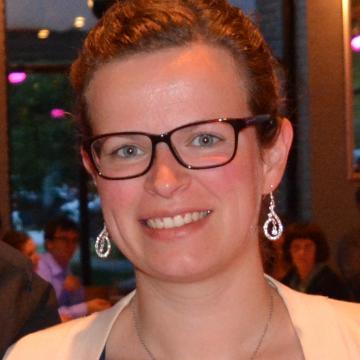prof. Charlotte Debbaut (PhD)

Principal investigator - BioMMedA
Associate professor, IBiTech-BioMMedA, Engineering for Health
Research focus
BioMMedA (Biophysical Models for Medical Applications) is a research group in the field of biomedical engineering. BioMMedA is part of the Institute of Biomedical Engineering and Technology (IBiTech) at UGent. The scope of its research ranges from simulations at the molecular scale to study membranes, (glyco)proteins, and ligands to the study of flow and transport processes of blood and biological fluids in various organ systems (cardiovascular, brain, liver, kidney, lymphatics) in humans and animals models (zebrafish, mouse, large mammals) and artificial organs, as well as biomechanical aspects of organ systems and medical devices. Hereby, research at BioMMedA often starts from clinically relevant questions in order to support and valorize a better understanding and diagnosis of pathophysiological problems, patient-specific treatment planning, and the design of medical devices.
Within BioMMedA, prof. Debbaut focuses on the use of computational biomechanics as a tool for personalized medicine in two main research areas: cancer and minimally invasive procedures. The cancer-related research includes topics on locoregional drug delivery to study the mass transport of drugs, e.g. in order to optimize and personalize transarterial therapies for liver cancer and intraperitoneal chemotherapy for peritoneal carcinomatosis. Also the mass transport in the lymphatic system is being investigated in order to better understand and treat lymphedema (potential side effect of breast cancer surgery and radiation therapy). Other topics include the biophysics of tumorous tissues and the development of planning tools in support of minimally invasive interventions, such as robot-assisted partial nephrectomy procedures for kidney cancer and catheter-guided interventions in the brain.
Biography
Prof. dr. ir. Charlotte Debbaut received the degree of ‘Bachelor of Science in the Engineering Sciences: mechanics-electrotechnics’ in 2007 (Ghent University) and the degree of interuniversity ‘Master of Science in Biomedical Engineering’ with greatest distinction in 2009 (Ghent University and Vrije Universiteit Brussel). In 2013, she obtained her ‘PhD in Biomedical Engineering’ entitled ‘Multi-level Modelling of Hepatic Perfusion in Support of Liver Transplantation Strategies’ at Ghent University (IBiTech-BioMMedA lab). Since 2013, she continued her research at UGent as a postdoctoral assistant. In 2015, she became part-time assistant professor in biofluids and artificial organs. Since 2019, she became full time professor in computational biomechanics.
With her expertise on biofluid mechanics, the research of prof. Debbaut mainly focuses on modelling organ perfusion (e.g. liver, kidney, artificial organs) in the context of transplantation, pathologies and therapies, as well as mass transport phenomena related to targeted or locoregional drug delivery applications (such as transarterial therapies for liver cancer and intraperitoneal chemotherapy). Prof. Debbaut is also involved in teaching for the Bachelor and Master programs in Biomedical Engineering at UGent.
The work of prof. Debbaut resulted in several scientific awards, of which a selection is listed here: Wichtig research award at the European Society for Artificial Organs (ESAO) conference (Skopje, Macedonia, 2010); PhD student paper competition award (cardiovascular flow track) at the American Society for Mechanical Engineering Summer Bio-engineering Conference (ASME-SBC) (Farmington, Pennsylvania, USA, 2011); Mimics Innovation Award winner at the Materialise World Conference (Leuven, Belgium, 2012); PhD award at the European Society for Artificial Organs (ESAO) conference (Rome, Italy, 2014); PhD award at the Belgian Transplantation Society (BTS) meeting (Brussels, Belgium, 2014); Research grant award at the Belgian Association for the Study of the Liver (BASL) meeting (Brussels, Belgium, 2015-2016).
Prof. Debbaut is a board member of several professional organizations, i.e. Engineering for Health (Gent, Belgium) and the National Committee on Biomedical Engineering (NCBME) from the Royal Society for Science and the Arts of Belgium (Brussels, Belgium).
Research team
- Prof. dr. ir. Charlotte Debbaut
- dr. Hooman Salavati (PhD) - postdoctoral fellow
- dr. Pieter De Backer (MD, PhD) - postdoctoral fellow
- dr. Mohammad Rahimi Gorji (PhD) - postdoctoral fellow
- Saar Vermijs - doctoral fellow
- dr. Joris Vangeneugden (MD) - doctoral fellow
- Kaat Wille - doctoral fellow
- dr. Kenzo Mestdagh (MD) - doctoral fellow
- Dauwe Bulckaen - doctoral fellow
- Vincent Belpaire - doctoral fellow
Key publications
- Mathematical Modeling of Intraperitoneal Drug Delivery : Simulation of Drug Distribution in a Single Tumor Nodule. DRUG DELIVERY 24 (1): 491–501, 2017.
- A Multilevel Framework to Reconstruct Anatomical 3D Models of the Hepatic Vasculature in Rat Livers. JOURNAL OF ANATOMY 230 (3): 471–483, 2017.
- Closed-loop Lumped Parameter Modelling of Hemodynamics During Cirrhogenesis in Rats. IEEE TRANSACTIONS ON BIOMEDICAL ENGINEERING 65 (10): 2311-2322, 2018.
- Quantitative Analysis of Hepatic Macro- and Microvascular Alterations During Cirrhogenesis in the Rat. JOURNAL OF ANATOMY 232 (3): 485–496, 2018.
- A 3D CFD model of the interstitial fluid pressure and drug distribution in heterogeneous tumor nodules during intraperitoneal chemotherapy. DRUG DELIVERY, 26:1, 404-415, 2019.
- Transarterial drug delivery for liver cancer: numerical simulations and experimental validation of particle distribution in patient-specific livers, Expert Opinion on Drug Delivery, DOI: 10.1080/17425247.2021.1853702, 2020
- Optimization of intraperitoneal aerosolized drug delivery using computational fluid dynamics (CFD) modeling. SCIENTIFIC REPORTS. 12(1), 2022.
- A hybrid particle-flow CFD modeling approach in truncated hepatic arterial trees for liver radioembolization : a patient-specific case study. FRONTIERS IN BIOENGINEERING AND BIOTECHNOLOGY. 10, 2022.
- Drug transport modeling in solid tumors : a computational exploration of spatial heterogeneity of biophysical properties. COMPUTERS IN BIOLOGY AND MEDICINE. 163, 2023.
- A novel three-dimensional planning tool for selective clamping during partial nephrectomy : validation of a perfusion zone algorithm. EUROPEAN UROLOGY. 83(5). p.413-421, 2023.
Contact & links
- Lab address: IBiTech-BioMMedA, Department of Electronics and Information Systems (Ghent University), campus UZ Gent, C. Heymanslaan 10, The Core, ingang 37, 9000 Gent, Belgium
- Personal LinkedIn
- Publications
- IBiTech-BioMMedA
- Engineering for Health : website & LinkedIn
- National Committee on Biomedical Engineering (NCBME) from the Royal Society for Science and the Arts of Belgium (Brussels, Belgium) : website & LinkedIn
- Prof. Debbaut is interested to receive invitations for presentations or talks